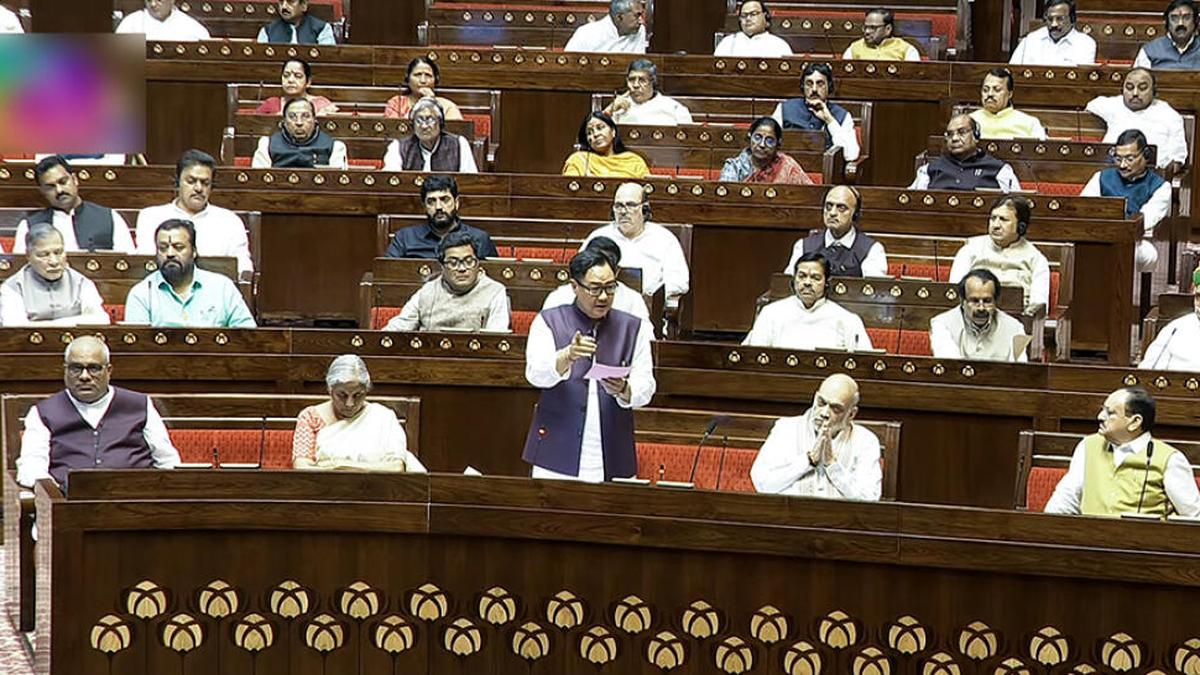(This is the latest edition of the Political Line newsletter curated by Varghese K. George. The Political Line newsletter is India’s political landscape explained every week. You can subscribe here to get the newsletter in your inbox every Friday.)
The passage of the Waqf (Amendment) Bill advances the political interests of the BJP in two significant ways.
First, this could create fresh political forces within the Muslim community. The BJP’s overarching approach to Muslims is one of exclusion, but there is more to it. Reforms that the party proposes for the community also weaken the notion of a monolithic Muslim political bloc. The ban and then criminalisation of triple talaq earlier found support from many Muslim women; and the amendments to the Waqf management law are proposed as a measure to free up the community’s wealth from the control of elites. This is for the benefit of poor Muslims, the government and the BJP argue. The extent of the BJP’s success in achieving these objectives is debatable, but these moves are certainly prompting new conversations among Muslims.
Second, the two key partners of the BJP — the Janata Dal (United) in Bihar and the Telugu Desam Party in Andhra Pradesh — stand weakened and deeply embedded in the senior partner’s political agenda. Their capacity to bargain hard with the BJP was limited from the very beginning, but both had claims of being Muslim-friendly. Their support for the Waqf Bill has eroded their standing within the Muslim community. They are unlikely to be backed by Muslims who support the amendments or those who oppose them.
BJP’s deep decolonisation drive
The BJP sees its current politics and governance as one of deep decolonisation. This is based on two premises — first, the Congress rule was merely an Indian version of an alien English model; and second, colonialism in India did not begin with the British, but with the arrival of Islam. So, an extended and deeper decolonisation drive is necessary for the resurgence of the country in this telling. “This is not merely education reform,” Union Education Minister Dharmendra Pradhan writes on the National Education Policy. “It is the intellectual decolonisation that India has awaited for a long time, which will catapult India into the comity of developed nations.”
In a similar vein, the government of Uttarakhand has renamed several places recently, removing the earlier Islamic ones. Some of the new names are pointedly Hindu, but also notable is the manner in which Dr. B.R. Ambedkar and Jyotibha Phule also come into the mix of new names. The BJP is careful in incorporating subaltern icons into its pantheon at local and national levels.
This approach of aligning with subaltern icons was visible during Prime Minister Narendra Modi’s visit to Nagpur recently. He paid tributes to the Rashtriya Swayamsevak Sangh (RSS) and Dalit leader Ambedkar in a day. Nagpur has been the centre of not only Hindu cultural nationalism but also its strident rejection represented in Ambedkar’s conversion to Buddhism. But a century of RSS politics, which is now also supported by state power, has muted this distinction between Hinduism and Buddhism. Radical Ambedkarism is still very much part of the mix of India’s political spectrum, but the BJP is very mindful of keeping it assuaged and controlled.
Law vs politics
Convicted on charges of embezzlement of public funds, Marine Le Pen, leader of France’s National Rally, is disqualified from holding public office for five years. She may not be able to run in the presidential election of 2027. Several European countries are trying to ring-fence their liberal politics from populist, nationalist raiders through legal barriers. Romania recently disqualified the winner of popular votes in the first round from staying on in the race for President.
American Democrats tried to stop Donald Trump from returning to the White House through legal means, but that path did not succeed. When institutional designs are largely aligned with the popular will, both work in tandem. When they come into head-on conflict, that is an indication of the fragility of the existing order, and a sign of the gathering clouds of revolution.
Romancing the border
In a move that predates the beginning of Donald Trump’s second presidency, the U.S. has barred government personnel in China from having romantic or sexual relations with Chinese citizens.
Threats to the nation can be internal and external, that border is not only geographical but also social. Therefore, borders are not only between countries but also between communities. Until 1967, when the U.S. Supreme Court declared them unconstitutional, several U.S. States had laws that barred inter-racial marriages. Many States in India have raised legal barriers for inter-caste and inter-religious marriages in recent times.
Federalism Tract
How might population-based delimitation of parliamentary constituencies help the BJP reinforce its electoral dominance by shifting political weight to its strongholds? Here are some numbers that make sense of it.
Published – April 04, 2025 09:28 am IST
